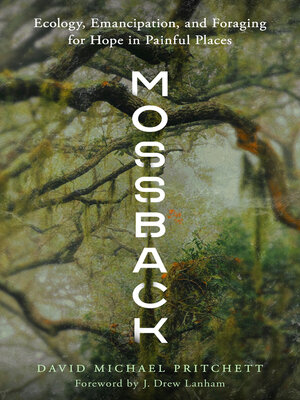Mossback
ebook ∣ Ecology, Emancipation, and Foraging for Hope in Painful Places
By David Michael Pritchett

Sign up to save your library
With an OverDrive account, you can save your favorite libraries for at-a-glance information about availability. Find out more about OverDrive accounts.
Find this title in Libby, the library reading app by OverDrive.



Search for a digital library with this title
Title found at these libraries:
| Library Name | Distance |
|---|---|
| Loading... |
In Mossback, David Pritchett traverses geography, history, and genealogy to explore landscapes and mythologies at the intersection of environmental, indigenous, and social justice. This collection of a dozen essays searches terrain—from the heart of a swamp to the modern grid lines remaking our watersheds, to the tracks of the animals who share this earth, to the inner landscapes of the soul—to find glimpses of light in dark places and hope in painful legacies.
Pritchett recounts a trip to Dismal Swamp, where he takes inspiration from the many enslaved people who found refuge there. Another piece offers two ways of seeing the landscape: the watershed as an ecological unit, and the grid as a colonial construct. Still another weaves personal narrative with the story of the Trail of Tears to describe how settler colonialism became an apocalypse for indigenous nations and ecologies. Pritchett explores an early apocalyptic story from the book of Daniel and considers new ways of relating to the land and its inhabitants. He focuses on the relationship between technology and trees to argue that humans have largely discarded ecological interrelationship in favor of extractive ways of living, and he travels the Ventura River, reflecting on waterways as being endangered but still operating as places of refuge for people and wildlife.
The word "mossback" has been used to describe rural southerners who lived in swampy areas during colonial times and moved so slowly that moss grew on their clothing. It is also used to describe fish and turtles who show similar growth on their shells, Confederate deserters who refused to fight and, after the war, southerners who fought against the Ku Klux Klan. Pritchett reclaims the word to celebrate those who move deliberately through the natural world, protecting the land and the relations they depend on.
Pritchett recounts a trip to Dismal Swamp, where he takes inspiration from the many enslaved people who found refuge there. Another piece offers two ways of seeing the landscape: the watershed as an ecological unit, and the grid as a colonial construct. Still another weaves personal narrative with the story of the Trail of Tears to describe how settler colonialism became an apocalypse for indigenous nations and ecologies. Pritchett explores an early apocalyptic story from the book of Daniel and considers new ways of relating to the land and its inhabitants. He focuses on the relationship between technology and trees to argue that humans have largely discarded ecological interrelationship in favor of extractive ways of living, and he travels the Ventura River, reflecting on waterways as being endangered but still operating as places of refuge for people and wildlife.
The word "mossback" has been used to describe rural southerners who lived in swampy areas during colonial times and moved so slowly that moss grew on their clothing. It is also used to describe fish and turtles who show similar growth on their shells, Confederate deserters who refused to fight and, after the war, southerners who fought against the Ku Klux Klan. Pritchett reclaims the word to celebrate those who move deliberately through the natural world, protecting the land and the relations they depend on.







